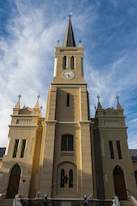19th Century Charm

Richmond was founded to meet the religious needs of the area’s farming community, who seeked a church to attend. Hence a church was built in 1847 from which the town grew; it was not built as the focal point of the town, but rather as a side building next to the village square.
The townsfolk wanted to name their new home after the then new Governor of the Cape, Sir Peregrine Maitland, who took office in 1844. Maitland declined the naming, and suggested it be named after his father-in-law, the Duke of Richmond, instead. It was officially named Richmond in 1845.
Richmond has numerous Victorian and Edwardian-style houses and buildings on its streets, preserved from the early 20th century. During the late 1800s and early 1900s, the town acted as a sort of ‘resort’ for European aristocratic patients who suffered from lung diseases such as whooping cough and tuberculosis. It was believed that Richmond’s clean air and mineral rich waters could cure them.
Important Resident
Richmond was once home to Dr Albert Hoffa, who played a pivotal role in South African medicine. He was born in 1859 and was the son of a local doctor. Albert went on to study in Germany and was mentored by Julius Wolff (known for Wolff’s Law), who was a professor at the University of Berlin at the time.
Hoffa became known as the “father of modern orthopedics” after he described a rare fracture of the knee, characterized by enlargement of the fat pad and aggravated by exercise. It was named Hoffa’s syndrome in his honour. His textbook, Book of Orthopedics, was published in 1891, and brought him world recognition. His work on Orthopedics is still in use today, as are many of his other writings on fracture, dislocation and massage.